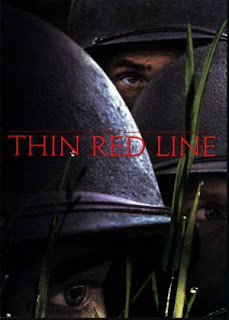 -I always focus on the bizarre casting decisions more than I ought to when I’m watching Thin Red Line. Something about the big names clashes with the film’s poetics, like they’re pop-up ads for their celebrity. I realize that Malick probably had a gazillion miles of film that probably would have provided feature-lengths for any one of a dozen moneymen, but, as is, showing up intermittently among ‘nobody’ soldiers, seeing faces like Clooney’s, Harrelson’s, and Leto’s is an engagement in ‘what doesn’t belong in this picture.’ I like to think that Malick is making a connection between the ignorance that pop culture creates, exploiting it by putting men in war zones – men for whom it seems like it would be illegal for them to actually be put in that kind of danger.
-I always focus on the bizarre casting decisions more than I ought to when I’m watching Thin Red Line. Something about the big names clashes with the film’s poetics, like they’re pop-up ads for their celebrity. I realize that Malick probably had a gazillion miles of film that probably would have provided feature-lengths for any one of a dozen moneymen, but, as is, showing up intermittently among ‘nobody’ soldiers, seeing faces like Clooney’s, Harrelson’s, and Leto’s is an engagement in ‘what doesn’t belong in this picture.’ I like to think that Malick is making a connection between the ignorance that pop culture creates, exploiting it by putting men in war zones – men for whom it seems like it would be illegal for them to actually be put in that kind of danger.
– In Toronto’s Images Festival last April, there was an event called Videodrome that was a video-mixing VJ dance party, and the opener, which lasted around half an hour, heavily sampled the voiceover from Thin Red Line. There were serious, anti-war tones in that ‘piece,’ but the dialogue came across as laughable and tacky. I was worried that that impression would stay with me any time I saw the film in the future, but Malick has a way a washing away the cynicism that really should be seeping through in every scene, having his characters naively ramble and inquire about nature and love and feeling, pondering where they come from and where they’re headed. He is genuine about it, and the artistry of his editing saves all of this from itself, and evokes these same questions, after a while, in the viewer. After the opening shot of the alligator, I could have believed anything that came out of anyone’s mouth.
